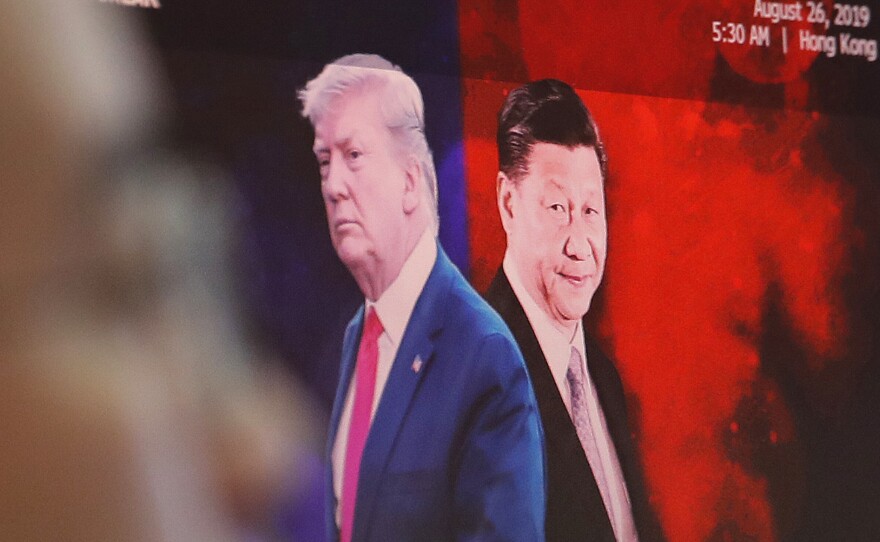Eight days before the Trump administration departed, it declassified a keydocument that it said "provided overarching strategic guidance" to its approach toward Asia, a region it dubbed the Indo-Pacific.
The 10-page, lightly redacted report, in use across the government since 2018, seeks to explain the challenges the U.S. faces from a rising and more assertive China, spells out vital U.S. interests in the region, and lays out a plan for both mobilizing and helping key allies in achieving U.S. aims.
The document states that the U.S. should maintain "diplomatic, military and economic preeminence" in the region while "preventing China from establishing new, illiberal spheres of influence." It also envisions a Korean Peninsula "free of nuclear, chemical, cyber and biological weapons" and expresses commitment to "accelerate India's rise" so that the two countries can "cooperate" to "preserve maritime security and counter Chinese influence."
The paper elucidates the motivations behind some of the Trump administration's actions toward China in particular, but analysts say it is self-contradictory and ideological in its aims and assertions. Critics say that by publicly releasing the document, the Trump administration was trying to bind the incoming Biden administration to its policies, while confirming China's worst fears about U.S. intentions.
President Biden is likely to keep some aspects of President Donald Trump's China policy; incoming administration officials have indicated they intend to continue to pressure China for its crackdown on Hong Kong's pro-democracy movement and support the Trump administration's declaration of genocide of Uighurs in the Xinjiang region. But the new administration is expected to lower the temperature and restart dialogue, especially on areas of common concern like climate change, while coordinating more closely with allies and partners.
Quest for "primacy"
The declassified document is "a blueprint for a Cold War 2.0," says Lyle Goldstein, research professor at the U.S. Naval War College. He calls the document's frank reaffirmation of the U.S. desire to maintain strategic primacy "an extreme position" because it simply doesn't square with reality. "That's not just true on the military side. I think the trend is probably even more manifest on the economic side," says Goldstein.
China is the largest trade partner to most Asian countries (and to many others around the world, including the U.S.). It is expected to surpass the U.S. in sheer economic size by 2028, according to a recent study in the U.K.
The U.S. desire to maintain primacy as the world's undisputed military and economic power is not just unrealistic, but it is also likely to lead to "zero-sum" thinking in which countering China's rise becomes the U.S.' biggest priority, says Michael D. Swaine, director of the East Asia program at the Quincy Institute for Responsible Statecraft, a Washington, D.C., think tank. "I would say [the document is] probably solely about containing China," he says.
He warns such an approach is likely to alienate allies and partners in Asia and beyond. While many may welcome a U.S. presence in the region as a counterbalance to China — and help in pushing back against China, say, in the South China Sea — they do not wish for a polarized, Cold War-like environment where every Chinese action and policy is treated by the U.S. as malign or threatening.
"Our friends and allies are not supportive of this kind of approach," says Swaine.
The Trump administration rolled out dozens of measures aimed at punishing China in the past year — for its policies in Hong Kong, its actions in the South China Sea and treatment of its Uighur minority — and Washington also imposed sanctions and prohibited and prevented U.S. companies and investors from doing business with or investing in many of China's high technology companies.
"They are coercively trying to impede China's own development," says Susan Shirk, chair of the 21st Century China Center at the University of California, San Diego. "Now, I know this is the Chinese view of it, but it's hard to characterize these actions in any other way."
A trap for Biden?
China predictably slammed the document. A foreign ministry spokesperson said that "its content only serves to expose the malign intention of the United States to use its Indo-Pacific strategy to suppress and contain China and undermine regional peace and stability."
Swaine worries the policy's declassification will empower hawkish elements in China's foreign policy establishment and provide them ammunition when advocating a tougher response to dealing with the United States.
The timing of the declassification points to an effort to box in the Biden team and prevent it from taking U.S. policy too far off the confrontational path that the Trump administration set it on, analysts say.
The Trump White House "recognize[d] that the Biden administration would like to adopt a different strategy toward China, one that would be more practical, and effective, and more in cooperation with allies," says Shirk.
Any effort on the Biden team's part to improve relations (and China has indicated a strong desire to do so) would likely have the administration fending off charges of being soft on China. Besides, any such endeavor would involve an enormous amount of work, given the rancor and mutual distrust that currently prevails between the two countries.
"I'm very pessimistic," says the Naval War College's Goldstein. "Getting back to normal would be very difficult, even if President Biden really wanted to do that."
Copyright 2021 NPR. To see more, visit https://www.npr.org.






